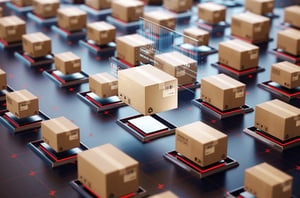When a company doesn’t have the resources to handle all of its operations in-house, they look for third-party resources to help them stay more productive. This is particularly true for small e-commerce businesses that don’t have the manpower to handle every aspect of the business with their staff.
While logistics might not be the first department that all companies think of outsourcing, hiring a third-party logistics company can come in handy. But just what is a third-party logistics company and what do they do?
What Is Third-Party Logistics?
Third-party logistics, or 3PL, is a system where an outside organization provides logistics services to companies that need inventory management and distribution. The term is often used interchangeably with fulfillment warehouses or fulfillment centers. Third-party logistics companies offer many of the same services as order fulfillment companies. These services include:
- Warehousing
- Shipping and receiving
- Inventory management and storage
- Picking and packing
- FTL and LTL freight shipping
- Kitting and customization
- Reverse logistics
When you work with a 3PL company, you are outsourcing your e-commerce logistics processes, bypassing the need to have an in-house logistics department or procedure. Third-party logistics companies can handle all or just parts of the logistics process for their clients. 3PL companies aren’t the only option, however.
What Is Fourth-Party Logistics?
Fourth-party logistics (4PL) was introduced to enhance the activities of 3PLs. A 4PL company is hired to control and manage all supply chain processes for businesses using a third-party logistics company. This partner will help with every step in the supply chain, including assessing, designing, building, running, and measuring solutions for their clients. A 4PL will oversee the warehouses, shipping companies, freights, and agents.
Basics of Third-Party Logistics
When working with a 3PL, inbound and outbound transportation is managed for you. A 3PL will also handle warehousing. Most third-party logistics companies own or lease warehouse space that they use for client needs. Your business essentially rents shelf space in this warehouse, and the 3PLwill keep track of your inventory, pack, and ship your products for you.
The 3PL company also contracts (or in some rare cases owns) a fleet of trucks that they provide their clients with for freight and shipping purposes. Third-party logistics companies may work with a variety of carriers to ensure that your orders are delivered to your customers.
The purpose of a 3PL is efficiency. With a 3PL, operations are designed to maximize efficiency as the warehouse employees offer their services without your company hiring additional staff, which requires time, money, and valuable resources that you might not be able to spare.
In addition to efficiency, a third-party logistics company can also help you reduce shipping costs and expedite delivery times, since they are working with many clients and can get bulk discounts for these services through their carriers.
The 3PL Process
Outsourcing your logistics needs means that your products will go directly from the manufacturing factory to your 3PL’s warehouse. When your inventory arrives, the 3PL process begins.
E-Commerce Platform Integration
Your business likely sells products across multiple channels. This means that your fulfillment warehouse will need to understand and integrate multiple sales platforms or create a custom API to handle your needs. They should also offer a dashboard that allows you to view orders and track their progress in real-time.
Freight Shipping and Receiving
Both full truckload (FTF) and less than truckload (LTL) freight can help you save money on freight costs, especially if you ship large orders to commercial or wholesale customers. These freight services help you ship products between warehouses or get them to a distribution point that is closer to your end customers.
Another value of a 3PL is that they can help guide you along the freight process, helping you find better deals and customer service for your shipping needs.
Inventory Management
Your third-party logistics partner can help provide the valuable service of inventory management, which is often a pain point for e-commerce companies. Working with easy to use warehouse management software, your inventory can be fully managed from all aspects, including restocking levels, supply chain management, and balancing seasonal inventory levels.
Picking, Packing, and Shipping
The core of order fulfillment lies in picking, packing, and shipping goods. Each time a customer places an order online, it goes through to your fulfillment warehouse. At the warehouse, someone picks the items for the order. After the items are located on warehouse shelves, they are brought to a packer, who chooses the right box, packages the order, and applies the shipping label. The shipper then makes sure the order goes out to the right carrier and is on its way to your customers’ doors.
Some 3PL providers offer same-day shipping services. Same-day shipping usually has a time cutoff, but same-day picking, packing, and shipping are all available if orders are placed prior to the cutoff time. The 3PL will set the cutoff time. Same-day shipping services lead to happier customers.
Support
Ensuring that you have support at your 3PL is important. The right support can make sure that your 3PL is an extension of your team.
Benefits of Third-Party Logistics
The benefits of third-party logistics include:
- Lower Cost of Goods: Purchasing products upfront allows you to pay wholesale pricing, meaning the more you buy, the lower your costs and higher your profit margins.
- More Control Over Logistics Operations: Choosing your own 3PL company allows you to pick a partner that provides the services that help you give your customers the best possible experience.
- More Flexibility in Product Sourcing: Using an e-commerce fulfillment business model, you can easily source products from multiple manufacturers. You will keep all of these products in the same warehouse, allowing you to ship products from multiple suppliers in one order to save on shipping costs.
- Faster Order Fulfillment: Choose a 3PL that has warehouses in locations that are convenient for quick deliveries.
What’s the Difference Between 3PL and Dropshipping?
We often hear some confusion around 3PL and dropshipping. It is important to note that third-party logistics companies aren’t the only way to outsource your order fulfillment needs. With a dropshipping business model, your order handling is also done by a third party. The main difference between a 3PL and dropshipping model is that with a 3PL, you will still be responsible for owning the inventory. On the other hand, the process of dropshipping is as follows:
- Your customer places an order through your website.
- Your store sends the order to your dropshipping supplier.
- Your drop shipping supplier prepares the order and ships it directly to the customer.
In the drop shipping model, your business doesn’t have to stock or own any of that inventory, but you can place an order with the drop shipping company as needed to fulfill those orders without any risk of sitting on a large amount of inventory should those items not sell well.
If you are looking for a third-party logistics company, consider Smart Warehousing. You can contact our team today. We are happy to discuss how we can help make operations run more smoothly for your business.


